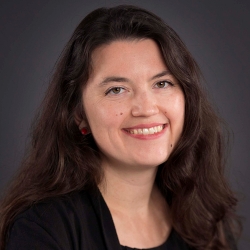
Dilara Yarbrough
Dr. Dilara Yarbrough is an Associate Professor of Criminal Justice Studies at San Francisco State University. She has a Ph.D. in sociology from the University of California, San Diego. Her research analyzes racialization and gendering through carceral and social service institutions and examines radical harm reduction and grassroots organizing as transformative approaches to social provision for people deprived of housing. Her writing has been published in academic journals including Punishment and Society, the Journal of Contemporary Ethnography and Social Problems. She has also coauthored policy reports in collaboration with San Francisco housing and gender justice organizations. Her collaborative projects have won awards from the Sociological Initiatives Foundation, the Society for the Study of Social Problems and the University of California Center for Human Rights. Dr. Yarbrough’s first book, Abolitionist Care, details how poverty relief services provided by and for sex workers and transgender women of color decouple social provision from punishment and explores ways to replace policing with provision of housing and care at a broader institutional scale.
Website(s): https://scholars.org/scholar/dilara-yarbrough
Dr. Yarbrough loves supporting students to achieve their dreams. Her classes emphasize building skills in creative problem solving, critical analysis, and academic writing.
Dr. Yarbrough's work centers the analyses of people affected by state violence and supports social movements for racial, gender and economic justice. Her favorite part of research is listening, and documenting the stories that allow us to collectively imagine a better future. Her research interests in the areas of poverty and social policy grew out of her past experience as a homeless service provider in the Bay Area. Supporting people to meet their survival needs in a context of scarcity made her want to learn more about the political and economic systems that produce oppression, and how to fight back.
- Yarbrough, Dilara (2021). The Carceral Production of Transgender Poverty: How Racialized Gender Policing Deprives Transgender Women of Housing and Safety. Punishment and Society 22(5): 681-702. https://doi.org/10.1177/14624745211017818
- Yarbrough, Dilara (2021). “You start with the youth”: Narratives of deservingness and dissent at a homeless service organization, Sociological Perspectives 65 (3): 506-528. https://doi.org/10.1177/07311214211019431
- Yarbrough, Dilara (2019). “Nothing About Us Without Us:” Reading Protests Against Oppressive Knowledge Production as Guidelines for Solidarity Research. Journal of Contemporary Ethnography 49(1): 58-85. https://doi.org/10.1177/0891241619857134
- Yarbrough, Dilara, Chris Herring and Lisa Marie Alatorre (2019). Pervasive Penality: How the Criminalization of Homelessness Perpetuates Poverty. Social Problems. 67(1): 131-149. https://doi.org/10.1093/socpro/spz004
- Yarbrough, Dilara, Jennifer Friedenbach, Olivia Glowacki, Samantha Lew, Chris Herring, Christoph Hanssmann, Mark Fleming, Kelsey Ludwig, Pike Long, Jamie Chang, Kat Sexton, and the Our City Our Home Coalition. Stop the Revolving Door: A Street-level Framework for a New System (2021). https://www.cohsf.org/stop-the-revolving-door/
- Yarbrough, Dilara and Christoph Hanssmann. Ending the Crisis of Transgender Homelessness (2021). https://www.cohsf.org/wp-content/uploads/2020/11/The-Crisis-of-Transgender-Homelessness.pdf
- Yarbrough, Dilara, Nicole Santamaria, Christoph Hanssmann, Sam Bosch and Mark Fleming. Preventing Homelessness Among TransLatinas in a Sanctuary City (2021). https://scholars.org/contribution/preventing-homelessness-among-translatinas
- Yarbrough, Dilara, Chris Herring, Tony Sparks and the San Francisco Coalition on Homelessness. Punishing the Poorest: How the Criminalization of Homelessness Perpetuates Poverty in San Francisco (2015). https://www.cohsf.org/Punishing.pdf